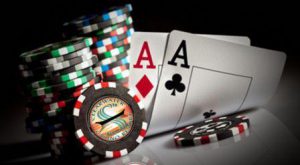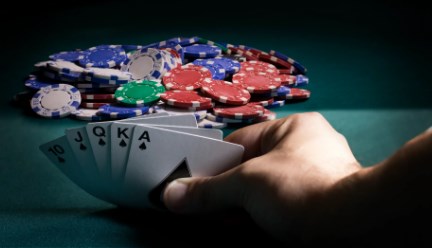Games, where you can have fun while making money, are always preferred by most players in the world, whether in a casino on land or in online casinos.
One of the oldest games is poker, which is not even clearly known about its place of origin, it is believed that it was born in France, but it was also found similar to a Persian game called As Nas, in the same way, it has said that he shares paternity with an old Renaissance game named First and with French Blean. Many other hypotheses revolve around the birth of poker, but it is possible that today’s poker is an influence of all those ancient games.
History of Poker

According to history, poker expanded in the United States around 1843 through barges that flowed down the Mississippi River, where they used cards as entertainment and included bets. The expansion of poker to other countries, essentially to Asia has been attributed to the United States Army.
As happens in a few games, the jargon has been part of the English-speaking cultures, with phrases like, “an ace in the sleeve, no idea, first, see a bluff, take advantage, put poker face, wildcard” between others, which are used not only at the poker table but in everyday conversations.
From 1970, after the World Series of Poker, the modern poker tournaments in the North American casinos became popular. Afterward, books about strategies appear. Nowadays poker has had fast growth worldwide due to the constant large influx of new players.
Poker: Game of Skills
In slot machine games you depend more on luck than on intellect, while poker involves various complexities that those who decide to play must be aware of, and if they plan to win they must constantly be perfecting their skills.
Beginners should know about all the useful resources that exist so that they are more confident and comfortable and begin to win. Here are six skills that a poker player must have to improve his game:
Poker is a skill card game, in which an additional random component is also included,it is important to know what are the main skills need it to succeed.
Poker requires a deep mathematical study and knows about its rules and norms, as well as the variants and opportunities that can be presented in a game. And precisely because of its strong mathematical component should be studied on the odds of winning a hand, or completing a play, and thus know if a correct play is being made.
The more knowledge and studies about the game you get the more prepared you will be to face the challenges that arise in the table games, and the greater advantage you will get over your rivals.
In poker as in any job, it is essential to have discipline, since it will allow you to achieve the goals or results that have been proposed. When goals are set, your game will become more serious and you will endeavor to apply your knowledge to achieve your goal more quickly than those who only play poker sporadically, or make less effort.
As in all games, there will always be situations that do not depend on us, even when we do things correctly, that kind of situations should not upset him, which is where he should stay focused and calm, dominating his emotions. Self-control is one of the main skills a poker player should have. The results may not always be as expected, even if your strategy is very good, it is important to have tolerance for frustration, and it is precisely that control of your emotions that will make you a better poker player.
The second player who is located to the left of who distributes the cards and in the left part of the small bet must cancel another bet corresponding to a larger blind, conformed by the amount of the sum of two small blinds.
Each player has the turn to change places and sit in other positions, which indicates that the point representing the dealer will move to another site when the hand finishes. The purpose of making this type of bets is simply to make an accumulated and guarantee players a pot at the end of each round.
When making this kind of bets, the next step is to distribute the cards. In this stage, 5 cards will be delivered covered or in a downward position, so that no other player tries to see and discover the card. The distribution is started in the participant and then the small bet continues with the other distributors who remain at the table.
There are two rounds to make the bets, the first is done when all the decks are distributed and start with the one on the left side of the one that made the big blind bet. The position of the players is decisive in this game, but the more you delay in making the play, the greater the chance of success.
This is because you can observe the plays of other members of the table and then you can act, having a better perception of the cards that others may have, according to their attitudes and plays.
As in other poker games, you have to bet on the bet that is on the table. This merits that the amount of the bet corresponds to the same amount or to an amount higher than the largest.
The result will become the bet that the big blind will be. It must “raise” the amount of the bet and make a substantial increase greater than the previous one. Generally, you should double the amount, at a minimum.
If a “fold” is made, it means that the cards are thrown as a sign that there is no interest in the play, because it considers that they are not good enough to obtain a victory. Continuing the action of the game in the clockwise direction, bets must be collected from each one, which must be the same or greater or until they withdraw from the round and show the cards.
The bet that the last participant makes is the big blind, in the case that the previous ones have not increased the amount, it is possible to “verify”. That is, they make a big bet beforehand and it is not necessary to do it again.
So, adding more money to the accumulated starts the next round. At the end of the bets, it starts with the participant on the left of the dealer in that hand. Players have to select how many decks they are going to replace.
You can keep 5, if you prefer, doing a “stand pat”. Likewise, they can throw all the cards if they want, but they are covered. Then they will be given the same number of decks to finish the hand.
Upon receiving the new cards, a second round will begin which will be the last one for bets. Here you start with the participant who will be in the delivery people. Now the previous process is repeated, with the difference that no bets are made. So, the player who starts can “check” if he wants and no more bets will be accumulated.
When all the participants have made their moves, they have placed their bets and the one that obtains the victory is called Showdown. When the hand is shown by the player closest to the left of the dealer, the activity continues on the table, passing to the next participant, who shows the hand or gets rid of the cards, if they are not good.
This determines that he has admitted failure and throws the cards in that hand. The winner will turn out to be the one who has the hand with 5 best poker decks, becoming the winner of the pot. By reviewing the positioning of your hands, you can begin to gain experience to enter games with cash bets and start earning wonderful rewards.

Poker is a game of skill that requires a combination of knowledge, strategy, and discipline. Here are some additional tips and insights that can help poker players improve their game:
Practice and Study: One of the best ways to improve at poker is to practice as much as possible. Studying the game and learning as much as possible about the rules, strategies, and odds is also important. Players serious about improving their game can take advantage of online poker training sites, poker books, and instructional videos.
Bankroll Management: Players must be disciplined and manage their bankroll effectively to avoid losing all their money in a single game. Setting a budget and sticking to it is advisable, avoiding the temptation to play high stakes games when their bankroll does not support it.
Bluffing: Bluffing is a key aspect of poker, and players must master this technique to succeed. Players must be able to read their opponents and know when to bluff and when to fold. Good players use their knowledge of the game, their opponent's playing style, and their own position at the table to make the right decision.
Position: Position is a critical factor in poker and can significantly impact a game's outcome. Players in a late position have an advantage over those in an early position because they have more information about their opponents' hands. Players in a late position can also make more informed decisions about whether to bet, call, or fold.
Patience: Patience is an essential quality for a poker player. Players must be willing to wait for the right cards and not get frustrated when they don't get good hands. Impulsive players who try to force the action are likely to make costly mistakes and lose their bankroll quickly.
Emotional Control: Emotions can significantly impact a player's game. Good players must be able to control their emotions and avoid tilting. Tilt is a term used to describe a player who has lost control of their emotions and is making irrational decisions. Players who tilt are more likely to make poor decisions, lose their bankroll, and get into arguments with other players.
Reading the Table: A skilled poker player must be able to read the table and pick up on the subtle cues that can indicate the strength of their opponent's hand. Experienced players can detect when their opponents are bluffing or when they have a strong hand. Reading the table can be valuable in making the right decisions and avoiding costly mistakes.
Bankroll Growth: One of the most important aspects of poker is bankroll growth. A player who can consistently grow their bankroll will likely succeed in the long run. Players should focus on improving their game, avoiding tilt, and managing their bankroll effectively to maximize their chances of success.
In conclusion, poker is a game that requires a combination of skill, strategy, and discipline. Players who want to improve their game must be willing to practice, study, and learn from their mistakes. They must also be disciplined, patient, and have emotional control to avoid tilt and make the right decisions at the table. By mastering these skills, players can become successful in the world of poker and potentially earn a significant amount of money.
Your guide to the best pokie games. Latest Pokie Tournaments, Jackpots and Promotions.